Greece’s Final Countdown Has Started
Adelina Marini, June 18, 2015
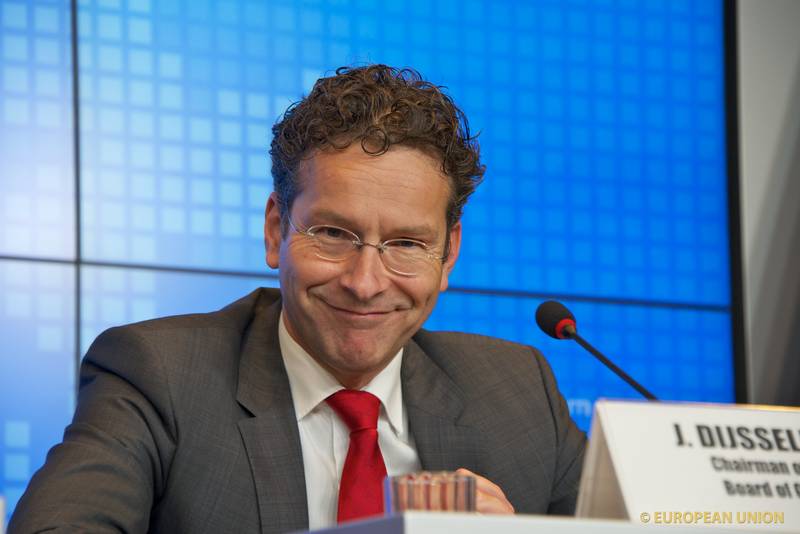 Everybody has their eyes on the clock that dispassionately ticks away the time left for Greece to make a decision whether to stay in the EU or not. This is the prevailing attitude before the start of a fateful meeting of the Eurogroup (Finance ministers of the Eurozone) in Luxembourg today, who are gathering to discuss the state of negotiations with Greece. Fateful, for it will mark the start of a countdown if a deal is not agreed upon. Optimism is exhausted. So is compassion. Fatigue is universal. Everyone wants the 6-year saga over one way or another. Nobody likes this game, with the possible exception of SYRIZA. A quick look at the headlines of euinside’s articles in our special topic, first called “The Greek Crisis” later to be renamed to “The debt crisis in the euro area” because of Ireland, Portugal etc., shows that 3, 4 even 5 years ago we had scary headlines: “Greece Has Started Playing a Russian Roulette Game”, “It Is Time for Greece to Decide: With or Without the Euro”, “Will Greece Become a State Beside Only a Name?”.
Everybody has their eyes on the clock that dispassionately ticks away the time left for Greece to make a decision whether to stay in the EU or not. This is the prevailing attitude before the start of a fateful meeting of the Eurogroup (Finance ministers of the Eurozone) in Luxembourg today, who are gathering to discuss the state of negotiations with Greece. Fateful, for it will mark the start of a countdown if a deal is not agreed upon. Optimism is exhausted. So is compassion. Fatigue is universal. Everyone wants the 6-year saga over one way or another. Nobody likes this game, with the possible exception of SYRIZA. A quick look at the headlines of euinside’s articles in our special topic, first called “The Greek Crisis” later to be renamed to “The debt crisis in the euro area” because of Ireland, Portugal etc., shows that 3, 4 even 5 years ago we had scary headlines: “Greece Has Started Playing a Russian Roulette Game”, “It Is Time for Greece to Decide: With or Without the Euro”, “Will Greece Become a State Beside Only a Name?”.
Although Greece has come dangerously close to bankruptcy in years past, there is a huge difference between then and now. As ex-Prime Minister of Finland and now Minister of Finance Alexander Stubb explained, there is no more sympathy for Greece. Moreover, whereas the survival of the whole Eurozone was at risk in 2012, in 2015 everyone agrees they can live through Greece. “To be honest, there are two options - a deal and probably extension of the programme under conditionality and a default. I don't believe in a domino effect in this stage. Greece can help itself”, added Mr Stubb. His Slovak colleague Peter Kažimír too was quite straightforward as usual.
“I’m afraid I'm not the only minister tired of this issue. We need to be honest with Greece and ourselves. There is no time left for the games. Greece has to face the reality. They might not like it, even we might not like it but we cannot cheat reality. When bill is due certain things need to be done and you have to do them. You cannot cheat. I do believe in miracles, I'm Catholic”, remarked Mr Kažimír.
Most of the ministers who spoke to journalists in Luxembourg were sceptical. Irish Michael Noonan even declared he did not expect a deal for the meeting was just a preparation for the far larger discussion of the leaders, thus hinting that next week’s summit, whose agenda is already tightly packed with extremely important and urgent matters, can again become preoccupied with Greece. There has been a lot of talk over the last few days about an emergency Eurozone leaders’ summit over the weekend, but the rumour was denied. Whether or not “larger discussion” also means a possible Plan B did not become clear from the Irish finance minister’s statement.
What is expected of Greece today is presenting clear proposals. According to Lithuanian Finance Minister Rimantas Šadžius a roadmap is needed. However, he was sceptical, stating there is no ground for a deal at the moment. No papers to sign. His Luxembourg colleague Pierre Gramegna was also not optimistic, reminding there are two deadlines coming up at the end of June. The first one is an IMF repayment date on which Greece must pay back 1.5 billion euro. At the beginning of June Athens surprisingly postponed repaying 300 million euro to the Fund, announcing they had the money, but are not paying until an agreement is reached. The second deadline is June 30 when the four-month extension of the current Greece bailout program expires.
Missing those two deadlines essentially means bankruptcy, leading to leaving the Eurozone. Everyone is saying they do not want that, but there is not a trace of the effort three years ago when everyone worked round-the-clock at unheard-of speed to save Greece, because it guarantied the survival of the Eurozone. “We are definitely not back in 2012”, said Italian Finance Minister Pier Carlo Padoan. On this background the Greek finance minister was brief upon entering the Council building in Luxembourg by stating that the Greek government would present their ideas today.
"We don't need just ideas but concrete proposals. Only concrete proposals can serve as a basis for a deal", snapped French Commissioner Pierre Moscovici (Socialists and Democrats), although he urged for sobriety and good will for, in his words, reaching an agreement was extremely important. Slovak Minister of Finance Kažimír’s ironic remark was “Surely this is the right time for ideas”. And his Finnish colleague Stubb stated that there have already been enough agreements with Greece. European Commission spokesman Margaritis Schinas denied that the EC had any intention to stop the clock. “It is ticking”, he said. “I don't have much hope. The time is really very little”, added the leader of the Eurogroup Jeroen Dijsselbloem and reminded the Eurogroup needed solid proposals. According to Irish Finance Minister Noonan a time has come to draft a Plan B.
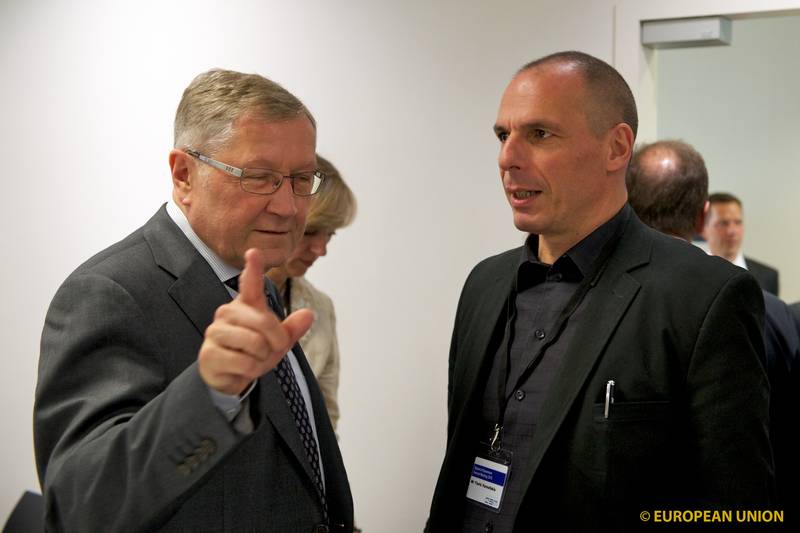 Although refusing to discuss possible scenarios after one more failure, finance ministers were radiating readiness for a worse scenario. For the first time since the crisis began there is a clear and present danger of an exit from the Eurozone. Some analysts are of the opinion that this will have severe consequences for the Eurozone for it would mean the common currency would lose its irreversibility for the first time since its irreversibility. Asked whether the Euro was irreversible today, at first, Finnish Minister of Finance Alexander Stubb confirmed it is so, but later clarified that in the past no one expected Finland to drop the Markka, but it is now part of the Eurozone. “Irreversible as any currency in this world”, he explained
Although refusing to discuss possible scenarios after one more failure, finance ministers were radiating readiness for a worse scenario. For the first time since the crisis began there is a clear and present danger of an exit from the Eurozone. Some analysts are of the opinion that this will have severe consequences for the Eurozone for it would mean the common currency would lose its irreversibility for the first time since its irreversibility. Asked whether the Euro was irreversible today, at first, Finnish Minister of Finance Alexander Stubb confirmed it is so, but later clarified that in the past no one expected Finland to drop the Markka, but it is now part of the Eurozone. “Irreversible as any currency in this world”, he explained
Without doubt all finance ministers have mobilised every drop of patience and are listening carefully to Minister Varoufakis presenting the Greek government’s “ideas” at this moment. It is very likely, though, that while listening most of them are looking at their watches. If the ideas are any good time will stop. At least IMF leader Christine Lagarde hinted as much. “If there are good proposals we will consider them”, she said. The Eurogroup boss however was firm that whatever the proposals were they must be solid and credible. If the meeting ends quickly we can expect a long and painful European Council meeting next Thursday that will draft the plan for shrinking the Eurozone to 18 members.
 Klaus Regling | © Council of the EU
Klaus Regling | © Council of the EU Mario Centeno | © Council of the EU
Mario Centeno | © Council of the EU Mario Centeno | © Council of the EU
Mario Centeno | © Council of the EU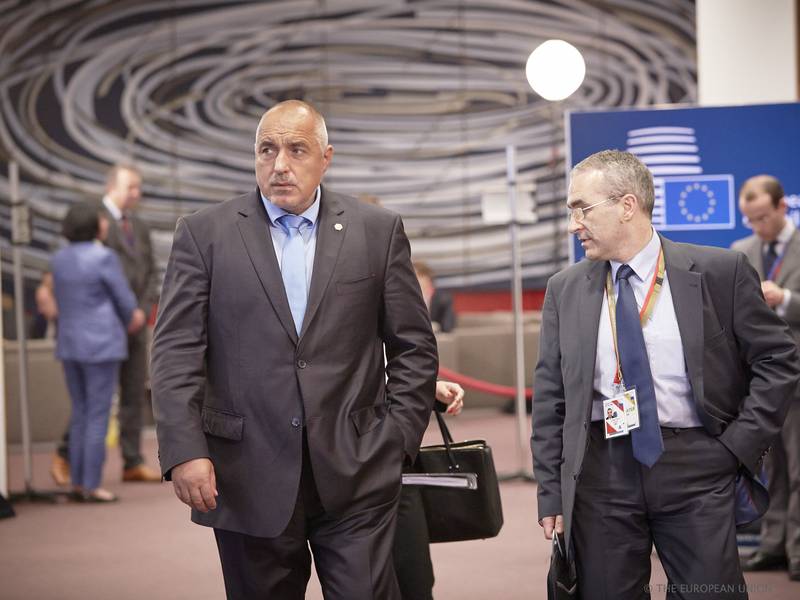 Boyko Borisov | © Council of the EU
Boyko Borisov | © Council of the EU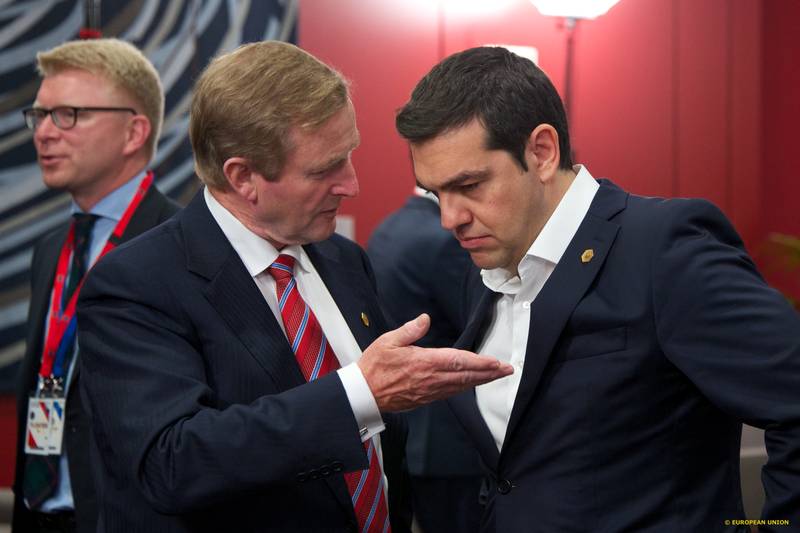 Enda Jenny, Alexis Tsipras | © Council of the EU
Enda Jenny, Alexis Tsipras | © Council of the EU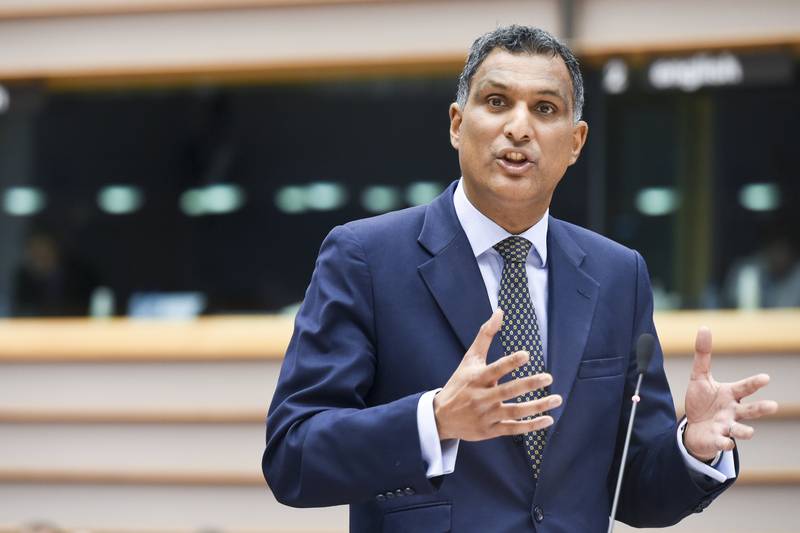 Syed Kamall | © European Parliament
Syed Kamall | © European Parliament